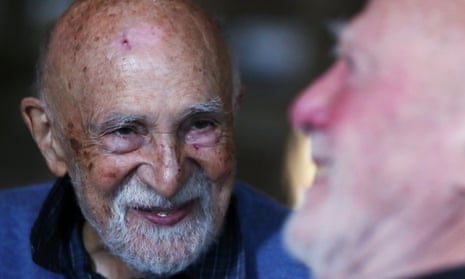The 90th birthday of Simon Gronowski, who at the age of 11 escaped a train destined for Auschwitz thanks to three Belgian resistance fighters, is being honoured with the staging of an opera inspired by his story near the rail tracks where he fled the Nazis eight decades ago.
Sitting alongside Gronowski during Sunday’s performance in Boortmeerbeek, a village north-east of Brussels, will be the sculptor Koenraad Tinel, whose elder brother was the Flemish SS guard who ordered him and his mother, Chana, on to the train on 19 April 1943. Chana did not escape from the transport and was killed in the gas chambers on arrival at the death camp.
The story of Gronowski’s rescue – the only time the resistance was able to stop a transport taking Europe’s Jews to their deaths – ranks among the most extraordinary of the second world war.
“The Nazis killed my mother and sister in 1943 in Auschwitz,” said Gronowski. “My father, who had escaped arrest, died in despair in July 1945. I myself was taken by the Gestapo on March 17 1943, in Brussels, and locked up in the Dossin barracks in Mechelen. On April 19, 1943, I was deported with the 20th convoy, but by a miracle I jumped off the train. All this only because we were Jewish.”
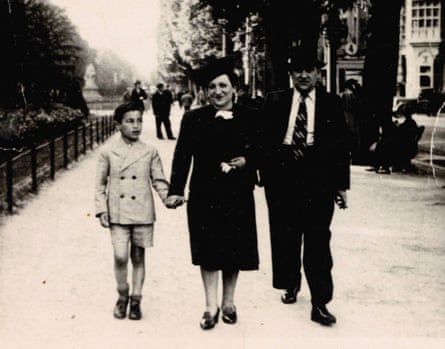
Gronowski and his mother were among 1,630 people being deported from Mechelen, a town north-east of Brussels. His father, Leon, had been in hospital when the Germans had raided their home a month earlier, while his older sister, Ita, 18, had Belgian citizenship, unlike the rest of the family, giving her protection for a few more months before her eventual deportation and murder.
Packed in like cattle with no food or drink and a bucket to share among 50 people, Simon and Chana were without hope. “The train did not start moving until the evening, and then the darkness in the car was total,” Gronowski said.
But shortly after leaving Mechelen the train abruptly stopped near Boortmeerbeek. Gronowski “heard screams in German and gunshots”. The train was being attacked by three young members of the Belgian resistance – Robert Maistriau, Youra Livchitz and Jean Franklemon.
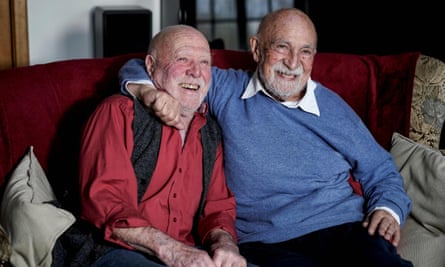
Armed with one pistol, the men had used red paper and a lantern to create a red light on the line, prompting the driver to brake, and they used pliers to cut through the wire holding tight the doors to one of the carriages. A shootout ensued with German guards but as the three resistance fighters fled, 17 of those on the carriage escaped.
Gronowski and his mother were not among them. The door to their carriage remained shut and the train carried on its way. But the incident had fired up some among them. After an hour, a group of men managed to tear open the door to the wagon in which they were trapped.
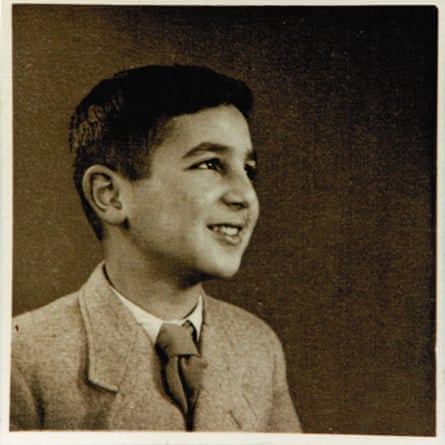
“The train left and I slept on the floor in my mother’s arms, with the impression that men in my car, deported like me, encouraged by the noise of the attack, were trying to open the door from the inside,” Gronowski said. “My mother woke me up.”
Gronowski was pushed by his mother towards the open carriage door. Too small to reach the footrail beneath the door by himself, his mother lowered him down by his shoulders. She had given him a 100 franc note moments before, which he had slipped into his sock. “The train was moving but the door was open and she made me jump off the train.”

He added: “I ran all night through the fields and woods. In the morning I landed at a Belgian gendarme’s house, who knew where I came from and did not denounce me. If the Nazis had known that a Flemish Belgian gendarme had protected an escaped Jewish child, they would have shot him. Then I took the train and returned to Brussels, to my father’s.”
For the duration of the war, Gronowski was hidden from the Gestapo by Catholic families. Of the 233 people who attempted to escape from the convoy, 26 were killed that evening, 89 were recaptured and 118 got away. Of the resistance fighters, Livschitz was later captured and executed, Franklemon ended up in Sachsenhausen concentration camp but was liberated in May 1945, and Maistriau was arrested in March 1944 and liberated from Bergen-Belsen camp at the end of the war.
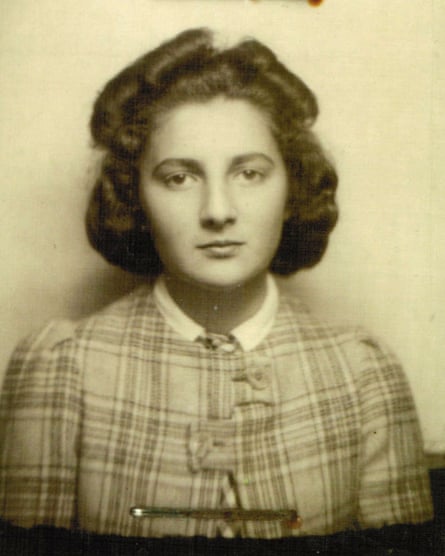
Like many who endured such horrors, Gronowski, who lives in Brussels where he became a lawyer after the war, did not want to share them. “For 60 years, I spoke little about these dramatic events,” he said. “Then someone came to me and told me that I had to testify and write my story. Since then I have been invited everywhere, especially in schools, in Belgium and elsewhere, to tell my story.”
He was introduced to the composer Howard Moody seven years ago. “I was a little sceptical: an opera on my story, is it possible?” Gronowski said. “But he did it, and it’s another miracle: Howard Moody was touched by my mother’s gesture of pushing her little boy out of the car and continuing on her way to death. [The opera] is a masterpiece.”
Moody said he wanted to show how “arrested citizens became nothing more than a number”. The opera, entitled Push, is being staged in Boortmeerbeek on Sunday, nine days before Gronowski’s 90th birthday. This summer the Brussels parliament gave approval to the erection of a monument to the three resistance fighters.
